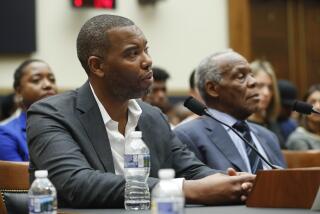There Are No Nuances When Talking Terror
- Share via
Re “The Subtle Shades of Villainy,” by Nicholas Goldberg, Opinion, March 28, about the ongoing violence in the Arab-Israeli conflict: The description of [Hamas leader] Abdulaziz Rantisi as a militant, rather than the terrorist that he is, is congruent with The Times’ editorial philosophy of avoiding calling him a terrorist. However, near the end, I applaud Goldberg for using the T-word discussing “Israel’s inability -- or perhaps its unwillingness -- to make distinctions among terrorists, to see nuances in Palestinian politics or to take into account the mood of the Palestinian street is worrisome.” Is he suggesting that there are distinctions between “good” terrorists and “bad” terrorists? Is Israel to grade them on a scale of how many innocents they kill? His concluding sentence is the summation that peace should be the goal, and I believe that this is paramount. Israel is still looking for its partner to be able to achieve that goal of peace.
J.B. Gillerman
Los Angeles
*
“Using the Withdrawal From Lebanon as a Guide for Gaza” (March 28) quotes Israeli concerns about leaving Gaza as: “ ‘Let’s not make the mistakes of Lebanon’ -- you hear that over and over.” The statement completely overlooks the fact that Israel has already made the mistakes of Lebanon by occupying the land in question for many years and waging war against the local citizens. The withdrawal process is just a measurement of how many innocents on both sides will have to die, and over what timeline.
Edward Saade
Poway
*
Re “A Line in the Sand,” March 29: Now that you printed a two-page spread on the “hardships” the Palestinians face with the fence, why not print a two-page spread on the wounded Israelis who have bolts and shrapnel in their bodies? On the maimed without arms and legs? Who has it harder? What is the reason for the fence? To me, it’s self-explanatory.
Leon Sturman
Canoga Park


